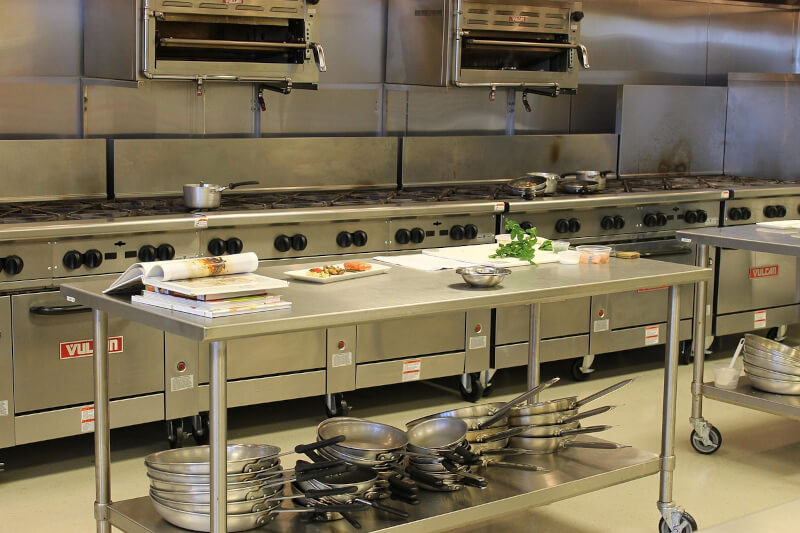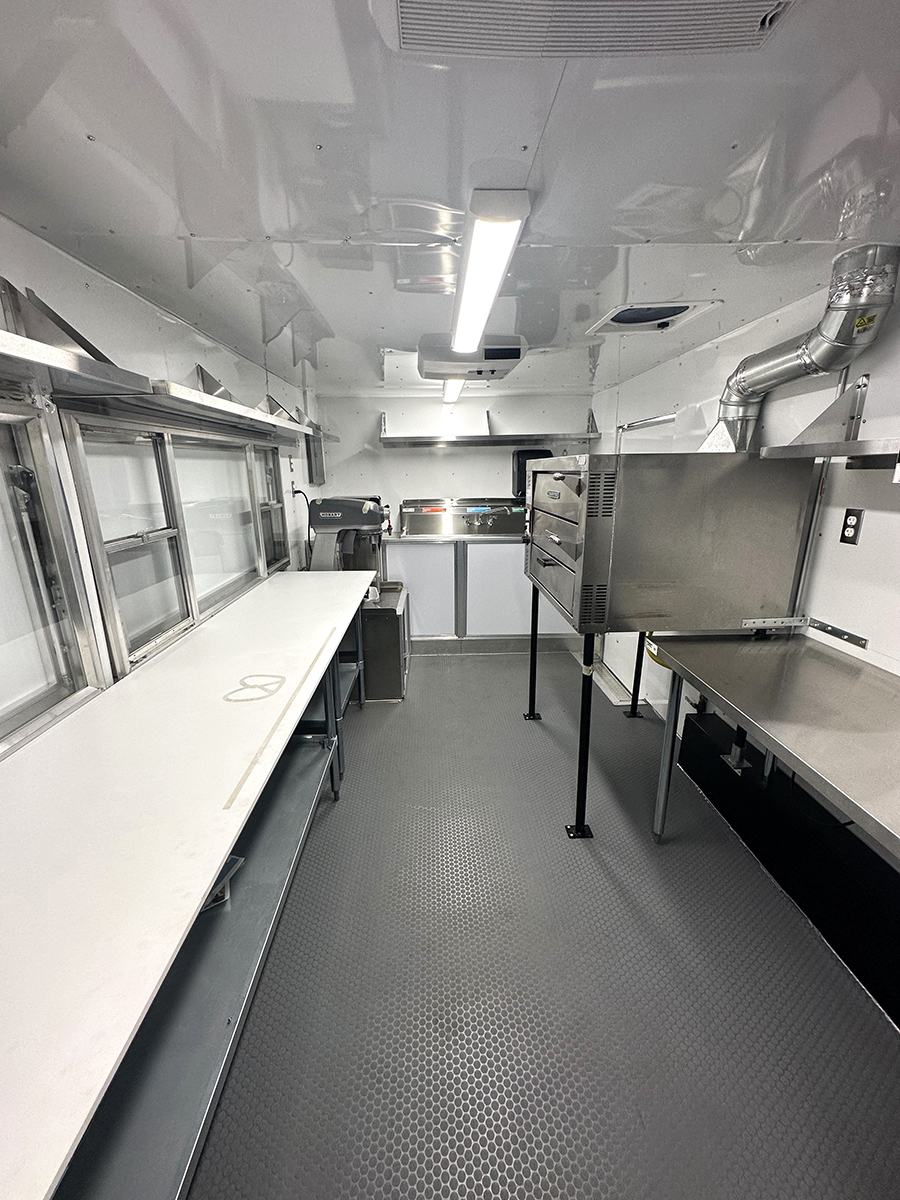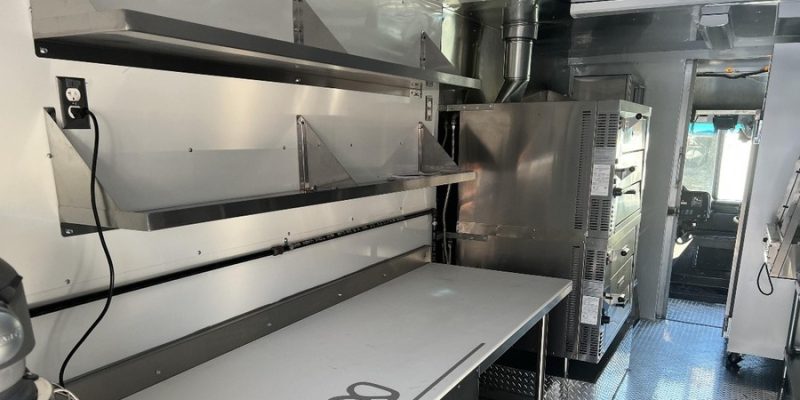If you plan to start a food truck, catering service, or mobile kitchen, you will need a place to legally prepare, store, and handle food. In most U.S. jurisdictions, that place is called a kitchen commissary, a licensed facility designed for commercial food production.
Understanding what a commissary kitchen is and why most states require one can help you avoid costly fines, failed inspections, and delayed permits.
What Is a Kitchen Commissary?
A kitchen commissary is a licensed commercial kitchen that food businesses can rent for food preparation, storage, and cleaning. It is a shared or private workspace that meets local food safety codes, allowing multiple operators to cook and operate legally.
These facilities are commonly used by:
- Food truck operators
- Caterers and meal-prep services
- Ghost kitchens and delivery-only restaurants
- Small food brands testing new products
Shared commissaries usually rent by the hour or through monthly memberships, giving small businesses access to equipment and space without the upfront cost of building their own kitchen.

Why Are Commissary Kitchens Required?
Health departments across the U.S. require all food prepared for public sale to come from an inspected, commercial-grade kitchen. A commissary ensures that food businesses meet strict sanitation and safety standards.
Key Reasons Commissary Kitchens Are Mandatory in Many Areas
1. Public Health Protection
Residential kitchens rarely meet the sanitary standards for food sales. Commissary kitchens are equipped with separate sinks, grease traps, temperature controls, and other features that protect consumers from contamination.
2. Local Health Department Rules
Many cities make commissary access a legal requirement for mobile food vendors.
For example, in Virginia, the Virginia Department of Health (VDH) requires all mobile food establishments to operate from an approved base of operations.
3. Permit Approval
When applying for food permits, local agencies often request a signed commissary agreement showing where your truck or operation will prep and store food. Without it, most applications are denied.
Key Takeaway
If your business sells food to the public, especially through a mobile kitchen or catering setup, a kitchen commissary is almost always required for licensing and health compliance.

Does a Food Truck or Food Trailer Need a Kitchen Commissary?
Yes. In nearly every state, a food truck or food trailer must operate in connection with a licensed commissary kitchen. This rule exists because food trucks are not equipped to handle all sanitation and storage requirements on their own.
Here is what this typically involves:
- Daily servicing: Many jurisdictions require mobile food units to return to their commissary daily for cleaning, restocking, and waste disposal.
- Water and wastewater: Trucks must use potable water and safely dispose of gray water at an approved site. Commissaries provide that access.
- Food storage: Dry, refrigerated, and frozen foods are often stored off the truck in labeled areas inside the commissary.
- Equipment maintenance: The commissary provides space for deep cleaning, oil disposal, and basic vehicle sanitation.
For example, Florida, Texas, and California all require a commissary agreement as part of a food truck’s health permit application. Local health inspectors regularly check that the agreement is current and that the commissary meets standards.
If you are unsure, contact your local environmental health office before launching your truck. Failing to have an approved commissary can result in denied permits or immediate closure after inspection.
Key Takeaway
A food truck or trailer must have a commissary kitchen connection in nearly all U.S. cities and counties. It is one of the first requirements to confirm before you start building or purchasing your mobile kitchen.
When You Might Not Need One
Some small-scale operations may qualify for exemptions under “cottage food laws” or home-based kitchen permits.
Examples include:
- Cottage food businesses that sell low-risk products like baked goods or jams.
- Microenterprise home kitchen operations (approved in parts of California) that produce limited meals for direct sale.
- Restaurants using their own licensed kitchen as a commissary for an additional operation.
Each exemption varies by state or county. For instance, California’s Health and Safety Code Section 114368.3 defines how a home-based kitchen may legally support small mobile operations.
Before assuming you are exempt, check with your county health department or local environmental health agency for written confirmation.
Commissary Kitchen Rules and Requirements
Operating or using a commissary involves meeting both building standards and administrative requirements. Here is what health departments typically require:
A. Facility Standards
- Approved construction: Smooth, washable floors and walls, proper ventilation, and safe plumbing
- Food storage: Clearly labeled areas for each operator’s dry, cold, and frozen goods
- Separate sinks: For handwashing, food prep, and dishwashing
- Temperature control: Refrigeration and hot-holding units must stay within regulated ranges
B. Licensing and Permits
- A valid health permit issued by the local authority
- Passing inspections for cleanliness, sanitation, and pest control
- If shared, each tenant must hold their own permit to operate within the facility
C. Waste and Grease Management
- Use of approved grease traps or interceptors
- Safe wastewater disposal and daily trash removal
- Maintenance logs to verify cleaning and pest control
D. Fire and Safety
- Certified fire suppression systems and extinguishers
- Proper ventilation and exhaust hoods for cooking equipment
- Clearly marked exits and emergency lighting
E. Recordkeeping
- Temperature logs, cleaning checklists, and pest control records
- Lease or usage agreements showing hours, responsibilities, and cleaning policies
Costs and Practical Considerations
Commissary costs vary based on location, size, and included services:
| Type of Kitchen | Typical Cost Range | Notes |
|---|---|---|
| Shared kitchen (hourly) | $10–$50/hr | Pay only for prep time |
| Dedicated space (monthly) | $300–$2,500/month | Often includes storage and equipment |
| Full-service commissary for trucks | $1,000–$2,500/month | Includes parking, waste disposal, water, and storage |
Choosing a Commissary
When selecting a commissary:
- Verify the kitchen’s health permit is active
- Ask if storage and parking are included
- Review cleaning responsibilities and operating hours
- Confirm the facility allows your food type (some prohibit frying or smoke-producing cooking)
How To Get Started
- Contact your local health department for a commissary agreement template
- Tour facilities in your area and compare rates, schedules, and amenities
- Sign a commissary use agreement and keep a copy for your permit application
- Schedule your inspection and maintain ongoing compliance logs
Final Takeaways
- A kitchen commissary is required in most U.S. jurisdictions for food trucks, caterers, and mobile vendors
- It ensures compliance with local health and safety laws by providing proper storage, waste management, and sanitation
- Always verify rules with your local health department before signing a commissary lease
- The cost of commissary use varies but is typically far less than building and licensing your own facility

